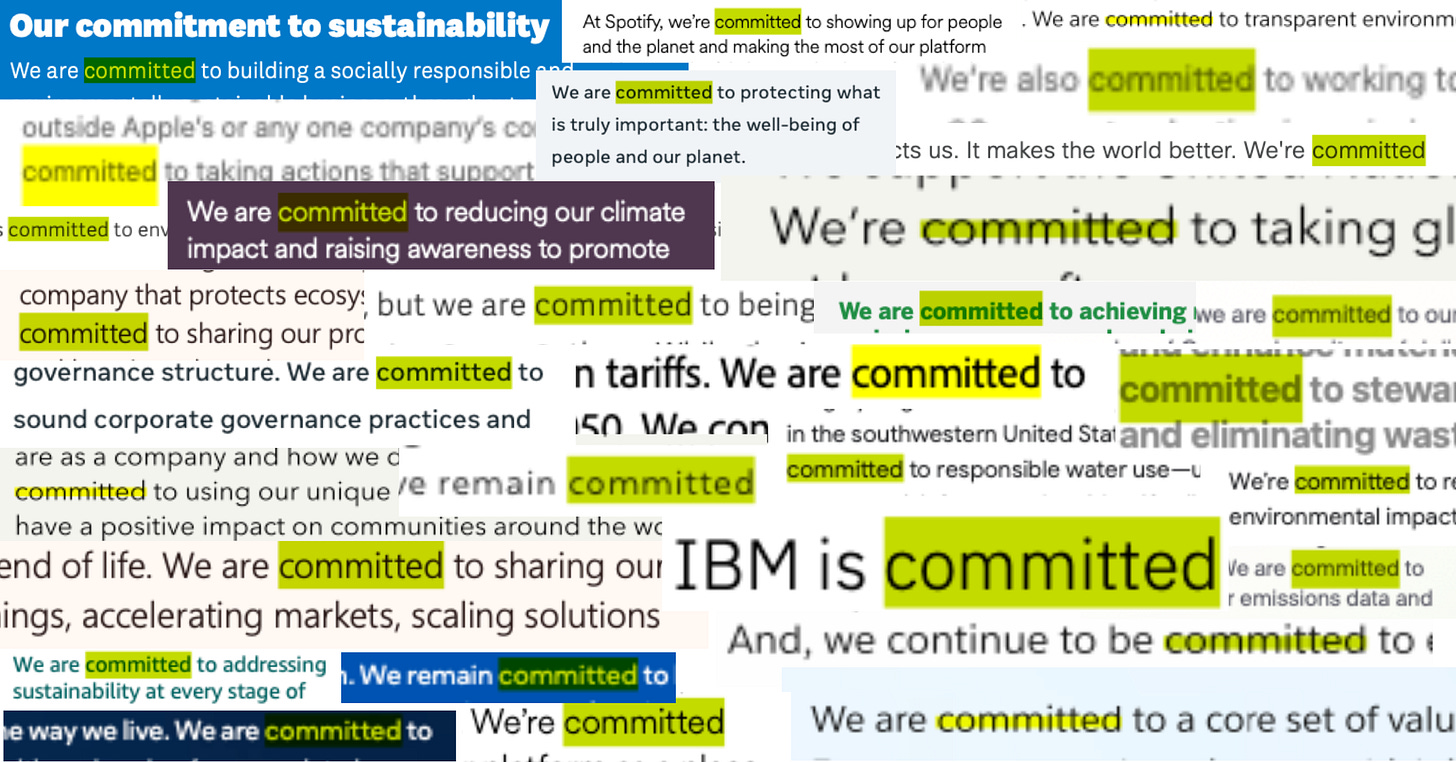TCC #64 — The next four years will show what 'committed' to sustainability actually means
It's going to be a wild ride, but it's also going to reveal who gives a damn.

I write a lot about words, and their value, and the dangers of attaching empty words to grand aspirations. Of all the empty weasel words companies use to parade virtue while evading actual responsibility, ‘committed’ is my favourite.
What does ‘committed’ actually mean? Cambridge Dictionary says to be committed means having promised to be involved in a plan of action. Gross! That’s what’s so slimy about this particular word. When companies say they’re committed, they’re not saying they’re taking action. They’re promising to be involved in a plan of action. Too many layers to undo there, so we won’t even get into that. TL;DR: doing something is good. Committing to something might be good, but it is not the same kind of good as actually just doing something.
Just about every major company is now ‘committed’ to sustainability in some way (or was, until November, and now have no clue which way’s up). We know why many of these companies prefer to say they are committed to something rather than that they are actually doing something: because the latter would most likely be an outright lie, whereas the former is just a promise that will only turn out to be a lie down the road. Why get in trouble for lying now when you could get in trouble later?
Anyway, there’s enough cynicism out there right now — you don’t need me adding to the noise. I know we’re in a tectonic shift right now. I know most of us are consumed by far more immediate and alarming concerns than shady corporate sustainability claims. But if anything good comes out of this mess — and if we still have a functioning America and world order come 2028, it may be that the next four years will reveal who exactly was telling the truth about being committed to sustainability, and who wasn’t.
For corporate sustainability commitments, the next four years will be like a good old shaking of the proverbial snowglobe: once the flakes settle, we’ll see which American (and international) companies have stuck to their transition plans and other initiatives because they were actually serious about it, and which ones abandoned the cause as soon as the going got tough, or as soon as it was no longer cool to be ‘woke’ (read: nice).
We’re already seeing it. Walmart, the early bird that gets the worm, unapologetically dropped its DEI initiatives late last year. Coca Cola, hoping no one would notice, quietly removed all mention of its ambitious reusable packaging target. Shell (shocker!) dropped its recycling initiative last year and followed that up with dropping its emissions target and is now cutting clean energy costs to make sure its shareholders get their payouts.
So far, so depressing.
These are early days, though. I think it will take the full span of this administration before we can truly separate the wheat from the chaff. It is entirely possible that even the best of them — even, for example, the U.S. based Corporate Knights — are preparing for a quiet few years on the sustainability communications front so as not to draw unnecessary attention to themselves. I’ve lamented corporate greenhushing before (mostly notably in our 2025 report), but I wouldn’t blame these companies for turning the volume down for a while if it meant the difference between survival and being taken down by your own government.
I think the next four years will be quiet across the board, so I don’t think we can sit here this summer, or this Christmas, or even at the midterms, and say that this company or that company is out of the race. But I do think that, for companies that want to be taken seriously on corporate sustainability — for the ones with a genuine desire to be corporate leaders guiding their industries along a better path — the next few years will be show time.
The act is up: if you don’t care about sustainability, you might as well drop it now. As we’ve seen, there are few real consequences to doing so. (Other than, of course! The whole climate crisis thing.) If you do care, well — it’s crunch time. Now you’re going to have to figure out how to take more climate action with fewer resources. How to navigate sustainability challenges alongside many other pressing challenges. How to make sustainability strengthen, rather than hobble, your core business model. How to frame it as an economic choice for your stakeholders and customers, and not as your Davos-Man CEO’s expensive hobby project.
Even if you have to cut down on some of what you’re saying publicly — well, good. Maybe spending less time reporting is what we needed all along. Maybe these four years are not about what you can disclosure, but what you can actually do: the progress you can make while fewer people are watching.
A lot can happen in four years.
Companies — like all of us — need to have a good long think about which side of history they want to be on.



